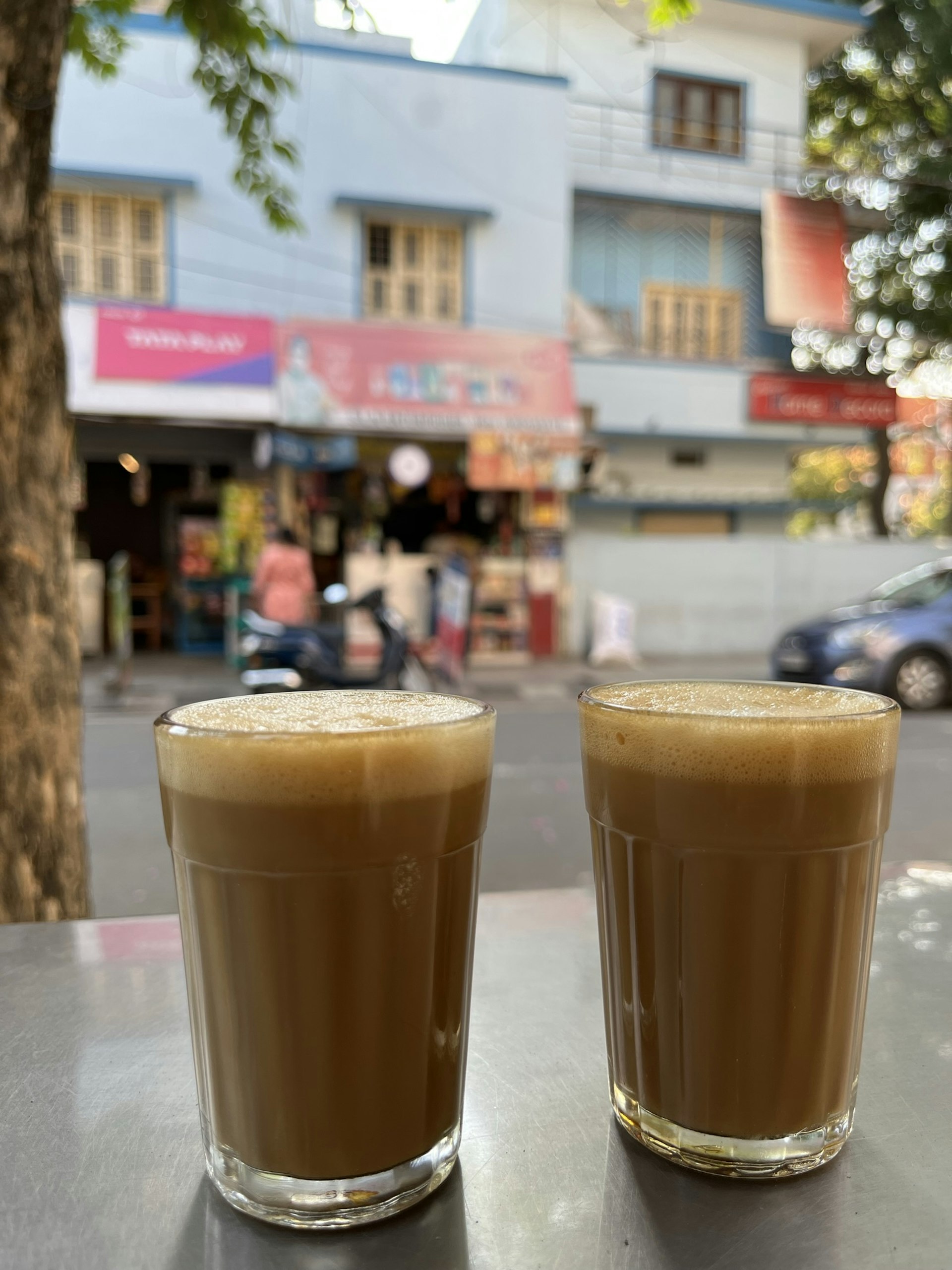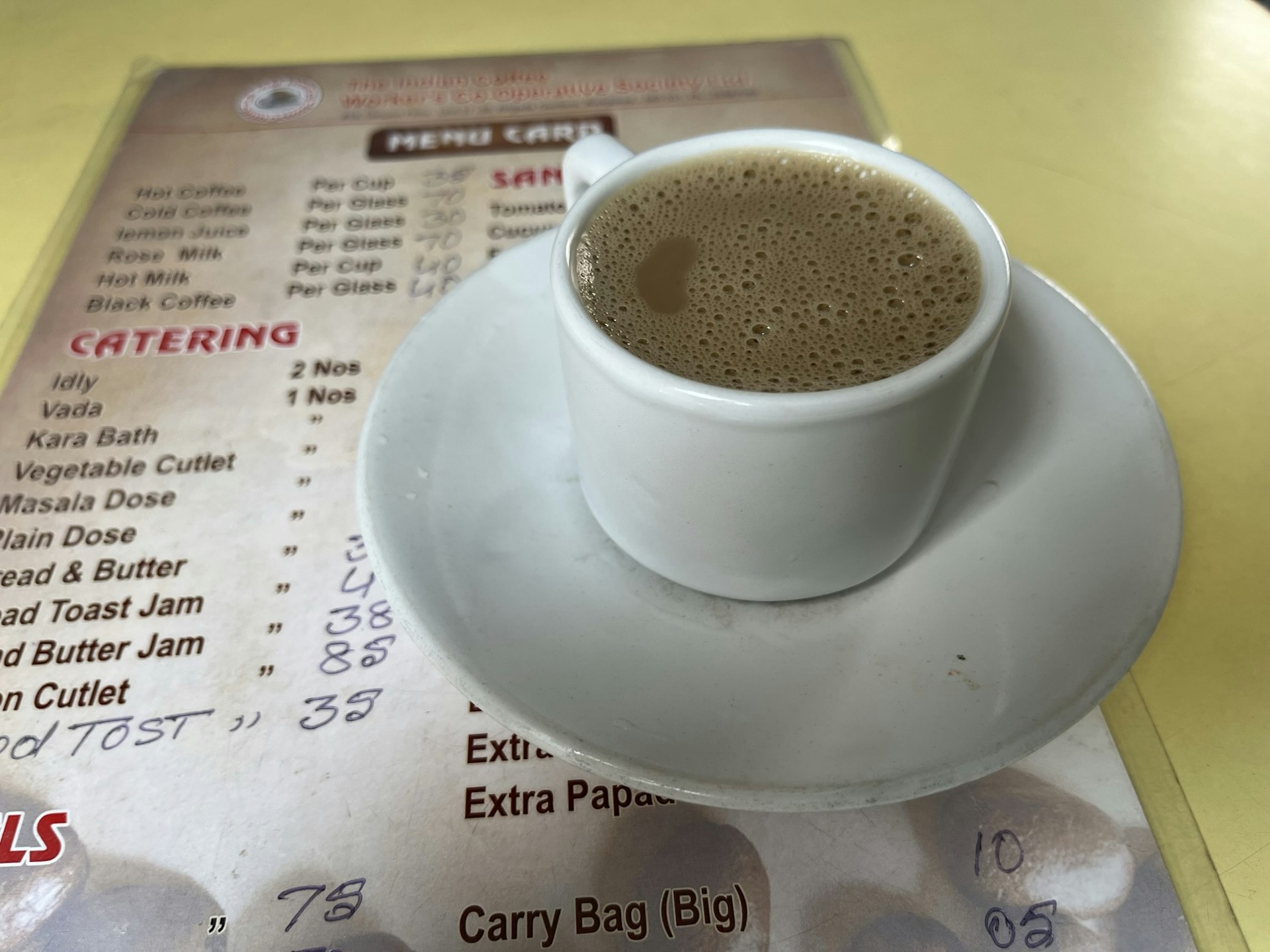India may be famous for its fragrant, spice-infused chai, but in Bengaluru (Bangalore) and elsewhere across South India, another hot caffeinated drink reigns supreme.
Walk past any local breakfast joint in Bengaluru and you’ll see swarms of people standing at stainless steel tables washing down fluffy idlis (South Indian spongy, round, fermented rice cake) and crispy masala dosas with piping hot cups of filter coffee, also known as filter kaapi.
The strong brew – milky, sweet, blended with chicory and often frothy – is a way of life for many Bangaloreans. Whether enjoyed at home, in vintage or contemporary coffee houses or at quick-service darshini cafes (vegetarian fast food spots), South Indian filter coffee fuels a city that’s always on the go.
“It is bold, it is intense and it is a small, short cup [of coffee],” says Suhas Dwarkanath, founder and owner of Benki Brewing Tools, a Bengaluru-based company that sells a wide variety of tools for expert home coffee brewing and also runs a coffee shop in the city.
Here are the best things to eat and drink in India
South India’s coffee history
South Indians’ love of coffee goes way back. Legend has it that Baba Budan, a 16th-century Sufi saint, brought coffee to India from Yemen on his way home from the hajj. Though it was illegal to take green coffee beans from the Arabian Peninsula, he smuggled seven of them to plant in the Chandradrona Hills, outside of Bengaluru, and so coffee cultivation in South India began.
Recent genetic studies on the origins of Indian coffee indicate there’s very little or no genetic variation, with possibly only one or two original plants, says Kurush F Dalal, an archaeologist and culinary anthropologist in Mumbai. “That suddenly puts the spotlight back on the Baba Budan story and makes a lot of people in the field wonder whether there is actually some truth in the legend.”
Thanks to Baba Budan or not, by the 20th century, coffee had become hugely popular throughout the southern states of Karnataka, Tamil Nadu, Andhra Pradesh and Kerala. Today, Karnataka produces more than 70% of India’s coffee – much of it for export – and many of its coffee cultivation areas, including Coorg and Chikmagalur, are now travel hot spots.

Bengaluru: India’s coffee capital
It’s no wonder then that Karnataka’s capital, Bengaluru, is also considered to be the coffee capital of India. Bengaluru is not only home to some of the most iconic places to get filter coffee, it’s also the birthplace of modern coffee shops like Café Coffee Day, the country’s largest coffee chain, and Third Wave Coffee, which is among the biggest specialty coffee chains in India.
Bengaluru became the go-to place for all things coffee in the 1940s, when the Indian government set up the Coffee Board of India’s headquarters there. Economic reforms in 1991 opened up India and slowly ushered in a new coffee era with the launch of large coffee chains and, more recently, an explosion of high-end and hip specialty coffee houses. While this may be putting pressure on filter coffee growers and roasters, filter coffee isn’t going away any time soon in South India.
“Having had the best coffees in the world, the most expensive coffees, and coffees from so many different countries, I still crave that chicory South Indian filter coffee some days because there’s so much nostalgia,” says Dwarkanath, whose company is also affiliated with the Specialty Coffee Academy of India, an education center that helps locals perfect their brewing techniques. Both companies are contemporary proof of a long tradition, and also a testament to how seriously Bengaluru takes its coffee.

Making the brew
Filter coffee is usually a blend of dark roasted coffee and chicory. Making it is a slow process. First, you need an Indian coffee filter that’s composed of two cylindrical metal cups on top of each other. Finely ground coffee is added to the upper cup, which has small holes on the bottom, and then lightly tamped with a plunger. Next, boiled water is poured into the cylinder. It takes 10 to 15 minutes for the brewed coffee, called a decoction, to collect in the lower cup.
Once the decoction is ready, boiled milk and sugar or jaggery are added. If you have filter coffee the traditional way, it’ll usually be served in a brass or stainless steel tumbler that sits in a shorter metal container. This tumbler/container set can also be used to cool the coffee and mix the ingredients together by pouring the liquid back and forth between the two. If you’re lucky, you might catch a skilled filter coffee maker quickly pouring the coffee from the highest heights.

5 of the best coffee places in Bengaluru
It’s likely that everyone you ask in Bengaluru will suggest a different favorite filter coffee spot. The list of places to enjoy it is almost endless, from iconic haunts like Koshy’s to more modern coffee chains like Hatti Kaapi. Even Starbucks now serves filter coffee.
Brahmins’s Coffee Bar
This popular institution in Basavanagudi has been serving filter coffee since the 1960s. With standing tables only, prices are low for both coffee and a limited menu of South Indian specialties, including idli and vada (doughnut-shaped deep-fried lentils) with coconut chutney. The name of this institution has generated some controversy for its reference to one of India’s castes, but all guests are welcome.
Mavalli Tiffin Room (MTR)
MTR has been a staple of Bengaluru’s dining scene for almost a century. With numerous locations around town (and globally), filter coffee is a highlight of its menu, which includes a wide range of South Indian dishes such as dosas, rava (semolina) idli and upma (rava cooked with onions, spices, chili peppers and coconut).
Veena Stores
This charming, no-frills eatery in Malleshwaram started off as a local condiments store in 1977. You’ll probably have to wait in line to try its filter coffee and South Indian breakfast items, which come with unlimited mint coconut chutney, but it’ll be worth it.
Indian Coffee House
This historic spot is great for old-school charm. Opened in the 1950s, its Church Street location still maintains blue and pink walls and staff in red and white uniforms. Grab a coffee along with South Indian or other dishes, like mutton cutlets and omelets.
Rameshwaram Cafe
With three locations in Bengaluru, this newer quick-service eatery has become popular fast. The Indiranagar location, for instance, is always teeming with people eating and waiting for the cafe’s filter coffee and specialties such as ghee pudi idlis, dosas, lemon rice and more.
